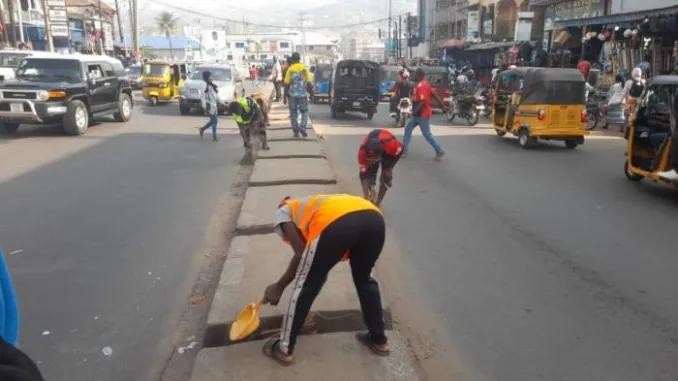By Kelfala Kargbo
Freetown, 1st September 2025- Before the sun rises over Freetown, hundreds of women are already at work—brooms in hand, aprons tied, sweeping the city’s streets with quiet determination. From Wilberforce to Signal Hill, Congo Cross to Kissy, these women form the backbone of a daily sanitation effort that keeps the capital breathing.
Among them is Fudia Mansaray, who begins her day at 4:30 a.m. “I sweep Wilberforce, Signal Hill, and Congo Cross,” she says. “Every day, we clean, but the waste keeps coming back.” Like many of her colleagues, Fudia covers multiple locations, often walking long distances to reach her assigned area. Her work is part of a city-wide initiative that employs over 800 sweepers, most of them women, under the Transform Freetown Project.
Another sweeper, Fatmata Sowa, leads a team in the same zone. She shares the frustration many sweepers feel. “We may sweep off waste and litter today; tomorrow, we find them again,” she says. “It’s discouraging when people throw trash right after we clean.”
These women are not just cleaning—they’re reclaiming public spaces, restoring dignity to the city’s streets, and doing so with minimal pay. Currently, sweepers earn NLe 69 per day, roughly $3, funded through a partnership between the Freetown City Council and the World Bank. The sweepers are contracted for six months at a time, with new recruits brought in periodically.
The initiative, launched in 2019 by Mayor Yvonne Aki-Sawyerr, aims to improve sanitation, promote climate resilience, and provide short-term employment. It aligns with the World Bank’s Sustainable Development Goals, particularly those focused on urban management and environmental health.
Despite their tireless efforts, waste continues to pile up. The Solid and Liquid Waste Collection Bye-laws of 2024 empower the council to fine residents up to NLe 5,000 or impose six months imprisonment for illegal dumping. But enforcement remains weak, and public behavior is a major hurdle.
Benjamin Sesay, a local resident, admits the problem is widespread. “People throw bins and plastic in the streets and gutters without caution. I’ve done it too,” he says. His candid confession reflects a broader cultural challenge, waste management is not yet seen as a shared civic duty.
Marian J. Tucker, Head of Environment and Sanitation at the Freetown City Council, acknowledges the issue. “We still face complaints about waste across the city,” she says. “The behavior of residents is one of our biggest challenges.” Tucker adds that the council is preparing to roll out household waste collection services, with 700 officers trained to educate and monitor communities.
But for now, the real work continues at dawn, led by women like Fudia and Fatmata, who sweep not just for wages, but for pride, for health, and for the hope of a cleaner Freetown. Their labor may be quiet, but its impact is loud. And until the city learns to match their commitment, the broom will remain both a tool and a symbol of resilience.









